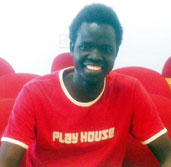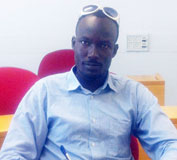 Brian Gersh is a student at The Interdisciplinary Center in Herzliya, Israel. Since last spring he has been raising funds to help two fellow students, who are Sudanese refugees, complete their studies at IDC as well.
Brian Gersh is a student at The Interdisciplinary Center in Herzliya, Israel. Since last spring he has been raising funds to help two fellow students, who are Sudanese refugees, complete their studies at IDC as well.
Gersh, 29, first learned about the problem facing African refugees when he arrived in Israel in 2008 and participated in a Masa program in Tel Aviv called Tikkun Olam. He was reintroduced to the issue last spring while on active reserve duty for the Israeli Defense Forces (he completed his army service in July 2011 as a staff sergeant in a combat unit).
“My unit was transferred to the unfenced area of the Egyptian border to give support to the unusually high number of Africans crossing over from Egypt,” said Gersh, who grew up in Overland Park as a member of Congregation Beth Shalom and graduated in 2001 from Blue

Valley Northwest High School.
Since 2005, Gersh explained, more than 60,000 Africans from a variety of different countries including Eritrea, Darfur and Sudan, have illegally crossed the Egyptian border into Israel.
“Many of them had stopped in Egypt where they were enslaved. There was a harsh crackdown by the Egyptian police where many of the asylum seekers were being murdered, so they crossed into Israel to seek refuge,” Gersh said.
Gersh studies along with Gabriel Thon and William Akon Deng at IDC in the International Government Program. Both entered the country illegally, served time in Israeli internment camps and are now full-time students. The two, and their families, were supposed to be deported this summer along with 2,000 other Africans.
According to a Washington Post article published June 15, 2012, the decision to expel Israel’s South Sudanese migrants first surfaced in early April, when the Interior Ministry issued a deportation order based on the idea that South Sudan’s independence in July 2011 had eased risks for the refugees. The Washington Post noted that human rights groups in Israel petitioned the order, citing the enduring armed conflict between Khartoum and South Sudan as evidence that the refugees would be at risk of death if deported. But the Jerusalem district court ruled that the rights groups were not successful in proving that the refugees would face imminent danger.
In his bio, Deng said he was very hurt when he heard the deportation news. He explained it took him many years to be able to go to school and after he finally started, the deportation order “seemed like a bad dream.”
A group of students, including Gersh, did successfully petition the Interior Ministry to get special exemptions for Thon and Deng, along with another four students attending Tel Aviv University and one in Beersheba. All students are studying either government or business.
However, none of the students were given working visas that would allow them to get jobs to pay for living expenses. That’s why Gersh began the fundraising campaign.
“Because of the huge influx of asylum seekers from Africa, any employers caught employing Africans will go to jail or get fined,” Gersh said.
Thon is grateful for the help he has been getting from Gersh and his friends.
“If it had not been for the generosity of friends, I would have not completed the last semester … I have to thank the school administration and the students for standing against our deportation. Brian being our friend and our classmate encourages us …,” Thon said.
Educating and taking care of these Sudanese refugees is important to Gersh for humanitarian reasons as well as Israel’s future.
“I believe this is a great chance for Israel and the South Sudan, a brand new Christian government, to start building diplomatic and economic relations,” Gersh said. “I believe to have a brand new Christian-based government in your neighborhood, especially in Africa, is a huge opportunity for Israel.”
Gersh points out that according to statistics provided by the World Bank, South Sudan is one of the world’s poorest and most underdeveloped countries. He said three out of four heads of household have no formal education whatsoever, and illiteracy and child mortality rates in the country are among the highest in the world.
Gersh said Thon and Deng definitely want to return to South Sudan once their studies are complete.
“They want to go back to South Sudan, but they need logistical and economic help in order to do that. They need two more years to finish their BA degrees in international government,” said Gersh, who is on track to also earn his undergraduate degree in the spring of 2014. He hopes to continue studying for an advanced degree in the future.
Local rabbis have agreed to help Gersh as have friends and family in Kansas City. Gersh, who returned to Israel late last week, also contacted some churches and priests while he was in the area. The African Refugee Development Center in Tel Aviv is assisting as well.
He emphasized that his fundraising campaign and support of these refugees is not a criticism of the Israeli government.
“What is going on there is a reaction to a problem that has been brewing,” he said. “There is crime in Tel Aviv, but the crime is coming because they are not giving working visas and one has to do what one has to do to survive, unfortunately.
“I criticize because I care. I love Israel. I’m a huge Zionist. I honestly believe that relations between these countries is what Israel needs and the best way to establish relations is by educating students who in time will rule their country.”
Eventually Gersh would like to establish a foundation where South Sudanese can be brought to Israel explicitly for education and then will return to their country to share what they have learned.
“I believe that’s a really good foundation for nation building.”
Help Sudanese students
Brian Gersh, through the New Israel Fund, is raising funds to help two students from South Sudan pay for living expenses while they attend college in Herzliya. To make a donation, send a check to New Israel Fund, 703 Market Street, Suite 1503, San Francisco, CA 94103. Make sure to write Gabriel and William on the memo line. For more information call 415-543-5055 or email . Questions may also be addressed to Gersh at .


